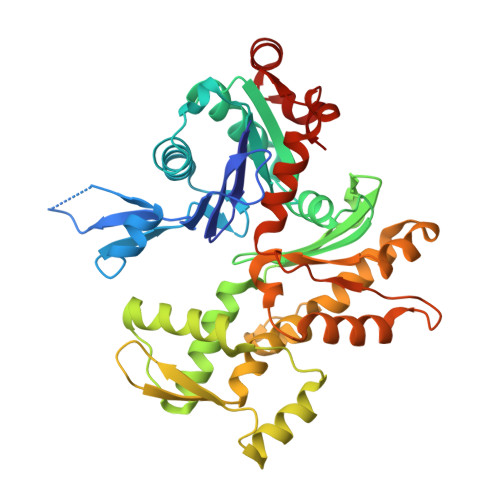A structural basis for regulation of actin polymerization by pectenotoxins.
Allingham, J.S., Miles, C.O., Rayment, I.(2007) J Mol Biology 371: 959-970
- PubMed: 17599353
- DOI: https://doi.org/10.1016/j.jmb.2007.05.056
- Primary Citation of Related Structures:
2Q0R, 2Q0U - PubMed Abstract:
(PTXs) are polyether macrolides found in certain dinoflagellates, sponges and shellfish, and have been associated with diarrhetic shellfish poisoning. In addition to their in vivo toxicity, some PTXs are potently cytotoxic in human cancer cell lines. Recent studies have demonstrated that disruption of the actin cytoskeleton may be a key function of these compounds, although no clarification of their mechanism of action at a molecular level was available. We have obtained an X-ray crystal structure of PTX-2 bound to actin, which, in combination with analyses of the effect of PTX-2 on purified actin filament dynamics, provides a molecular explanation for its effects on actin. PTX-2 formed a 1:1 complex with actin and engaged a novel site between subdomains 1 and 3. Based on models of the actin filament, PTX binding would disrupt key lateral contacts between the PTX-bound actin monomer and the lower lateral actin monomer within the filament, thereby capping the barbed-end. The location of this binding position within the interior of the filament indicates that it may not be accessible once polymerization has occurred, a hypothesis supported by our observation that PTX-2 caused filament capping without inducing filament severing. This mode of action is unique, as other actin filament destabilizing toxins appear to exclusively disrupt longitudinal monomer contacts, allowing many of them to sever filaments in addition to capping them. Examination of the PTX-binding site on actin provides a rationalization for the structure-activity relationships observed in vivo and in vitro, and may provide a basis for predicting toxicity of PTX analogues.
- Department of Biochemistry, Queen's University, Kingston, Ontario, Canada K7L 3N6.
Organizational Affiliation:



















